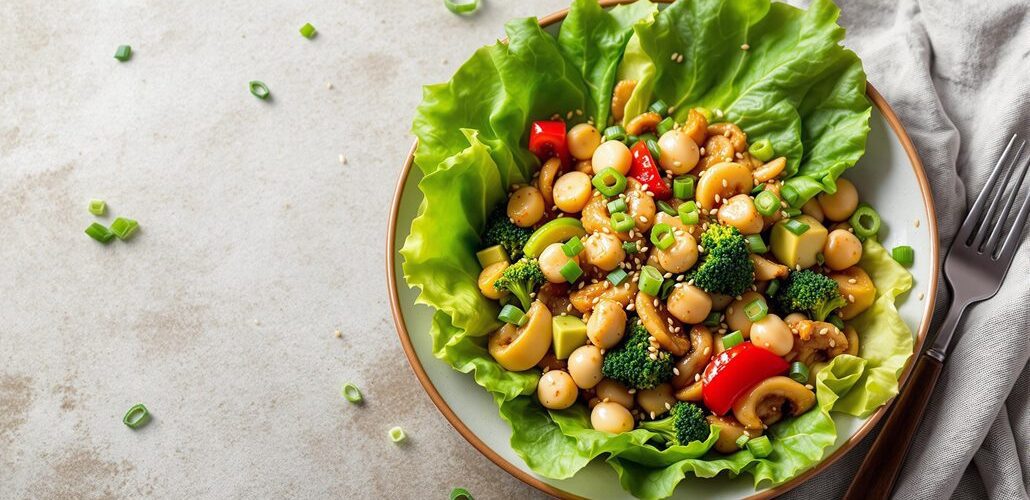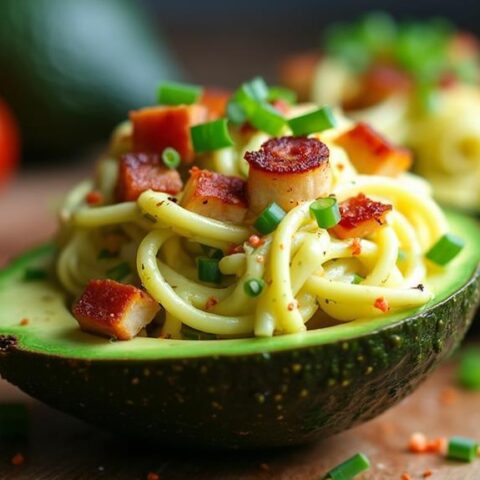
Water chestnuts can be integrated into a ketogenic diet with careful moderation. They contain approximately 5.29g of net carbohydrates per 100g, with a 30g serving yielding around 1.9g of net carbs. Their high glycemic index can impact blood sugar levels, potentially disrupting ketosis if not consumed judiciously. Despite their carb content, water chestnuts offer nutritional benefits like dietary fiber, potassium, and antioxidants. These should be treated as an occasional indulgence rather than a staple to maintain keto adherence. By monitoring portions and pairing with high-protein foods, they can fit into a balanced meal plan effectively—discover more nuanced insights ahead.
Key Takeaways
- Water chestnuts have approximately 5.29g of net carbs per 100g, impacting keto carb limits.
- A 30g serving contains about 1.9g of net carbs, allowing occasional inclusion in a keto diet.
- They have a high glycemic index, posing a risk for disrupting ketosis.
- Moderation is crucial; regular consumption may interfere with maintaining ketosis.
- Portion control and mindful carb management are essential for keto dietary adherence.
Keto Compatibility of Water Chestnuts
When evaluating the keto compatibility of water chestnuts, one must consider their carbohydrate content in relation to the strict limitations of a ketogenic diet. Water chestnuts contain approximately 5.29 grams of net carbs per 100-gram serving.
While this net carb content may initially seem prohibitive for those adhering to a strict keto diet, a smaller 30-gram serving contains only about 1.9 grams of net carbs. This allows for their occasional inclusion without exceeding daily carb intake limits, typically set between 20 to 50 grams for keto adherence.
It's important to note that, unlike starchy vegetables such as potatoes and corn, water chestnuts can fit into a keto diet when consumed in moderation. Incorporating water chestnuts into a low-carb meal plan requires meticulous portion control to guarantee that the net carb content remains within the acceptable range.
Despite their low-calorie content and the health benefits associated with dietary fiber, water chestnuts should not be mistaken for a staple within the keto framework. Rather, they should be treated as an occasional indulgence.
This approach maximizes their potential benefits without risking disruption to ketosis. By implementing a balanced strategy, individuals following a ketogenic diet can enjoy the unique texture and flavor of water chestnuts while maintaining strict dietary compliance.
Nutritional Profile Analysis
The nutritional profile of water chestnuts reveals a complex balance of macronutrients and micronutrients relevant to dietary planning. Water chestnuts contain approximately 9.15g of total carbohydrates per 100g, with dietary fiber contributing 2.8g. This results in about 6.35g of net carbs per 100g serving.
For those adhering to a healthy keto diet, monitoring the net carbs per serving size is essential to maintain ketosis. It's important to reduce carbohydrate intake to 20-30 grams/day to achieve and maintain ketosis, which underscores the necessity for portion control when consuming water chestnuts. A standard 30g serving size of water chestnuts provides 1.9g of net carbs, underscoring the necessity for portion control to align with daily net carb limits.
Beyond their carb content, water chestnuts are low in calories, offering only 42.0 kcal per 100g, which supports weight loss and weight management strategies. Their high water content further enhances satiety without markedly adding to caloric intake.
Additionally, water chestnuts provide essential nutrients, including 49.0mg of potassium and 0.25mg of iron per 100g, contributing to overall health maintenance. While they offer nutritional benefits, their carbohydrate profile requires careful consideration for those following a ketogenic diet, emphasizing the importance of integrating them thoughtfully within broader dietary frameworks.
Glycemic Index Insights
Water chestnuts, due to their high glycemic index, can greatly impact blood sugar levels, making them a questionable choice for individuals adhering to a ketogenic diet.
The carbohydrate content of water chestnuts, approximately 9.15g per 100g serving, poses a risk of disrupting ketosis, particularly if not carefully monitored. While the fiber content offers some glycemic moderation, it remains insufficient to offset the potential ketosis disruption.
Furthermore, for those managing type 2 diabetes, maintaining steady blood sugar levels is essential, and the high glycemic impact of water chestnuts could be counterproductive.
As a result, it's important to underscore the importance of controlled portion sizes and mindful carbohydrate management.
Blood Sugar Impact
Despite their appeal in various culinary dishes, water chestnuts present challenges for those monitoring blood sugar levels due to their high glycemic index. As a starchy carbohydrate, they are likely to cause significant spikes in blood sugar, which can be detrimental for individuals adhering to a keto diet. A typical serving contains over 20 grams of net carbs, a level of carbohydrate density that can disrupt ketogenic goals by pushing the body out of ketosis.
The high glycemic index of water chestnuts necessitates careful portion control to maintain stable blood sugar levels, especially for those who regularly consume these tubers. While the fiber content in water chestnuts offers some mitigation of glycemic impact, it is insufficient to classify them as low-glycemic foods. The potential for blood sugar fluctuations remains a concern.
For individuals aiming to manage their blood glucose effectively while on a ketogenic diet, the high carbohydrate density of water chestnuts underscores the importance of moderation. Those committed to maintaining stable blood sugar and achieving their ketogenic goals should consider alternative foods with lower glycemic indices and reduced net carb content to support their dietary objectives.
Carb Content Analysis
Understanding the carbohydrate profile of water chestnuts is fundamental for those adhering to a ketogenic diet, given their potential impact on daily carbohydrate limits. Water chestnuts contain approximately 5.29 grams of net carbs per 100-gram serving, which can greatly affect daily carb intake. This carbohydrate content necessitates careful portion control and moderate consumption to maintain ketosis. The glycemic index (GI) of water chestnuts is presumed to be high, attributed to their starchy carbohydrate composition, which may lead to increased blood glucose levels. Consequently, the GI insights suggest that water chestnuts could pose challenges for individuals on a keto diet.
Here is a detailed breakdown:
| Serving Size (g) | Net Carbs (g) | Daily Carb Impact |
|---|---|---|
| 100 | 5.29 | High |
| 50 | 2.65 | Moderate |
| 30 | 1.9 | Low |
| 10 | 0.53 | Minimal |
The table illustrates the importance of portion control when incorporating water chestnuts into a keto diet. Regular consumption may disrupt ketosis due to their carbohydrate content, emphasizing the need to monitor cumulative carb intake diligently. For keto dieters, occasional and moderate consumption is advised to avoid exceeding typical daily carb allowances, ensuring the maintenance of the metabolic state of ketosis.
Ketosis Disruption Risk
The high glycemic index of water chestnuts presents a notable ketosis-disruption risk for individuals adhering to a ketogenic diet. Water chestnuts, with their starchy nature, contain approximately 5.29g of net carbs per 100g, which considerably impacts daily carb limits set by those on a keto diet.
The glycemic index indicates a propensity for rapid blood sugar level spikes, potentially dislodging individuals from a state of ketosis. This carbohydrate intake must be meticulously monitored to maintain the metabolic state critical for the keto diet's effectiveness.
Despite the dietary fiber in water chestnuts, which can mitigate some glycemic impact, the high carbohydrate content remains a concern. For keto meal planning, the incorporation of water chestnuts requires a cautious approach due to their potential to exceed the recommended daily carbohydrate limits of 20-50g.
Consuming them in larger quantities could jeopardize ketosis.
- Net carbs of 5.29g per 100g contribute considerably to daily carb limits.
- Their starchy nature leads to a high carbohydrate load per serving.
- Potential for blood sugar spikes raises ketosis disruption risk.
Health Benefits Overview
Many find water chestnuts to be an excellent addition to a keto-friendly diet due to their low-calorie content and rich nutritional profile. Containing just 42 kcal per 100g, they are a strategic choice for individuals focused on weight management. Their high dietary fiber content (2.8g per 100g) not only aids digestion but also enhances satiety, which is critical for maintaining metabolic health within a keto framework. Moreover, the presence of potassium (49.0mg per 100g) in water chestnuts supports fluid balance and muscle function, contributing to overall health.
The antioxidant properties inherent to water chestnuts, particularly gallocatechin gallate and ferulic acid, reduce oxidative stress, posing potential cancer benefits. In addition, essential nutrients such as vitamin B6, copper, and manganese play pivotal roles in metabolic processes, antioxidant defenses, and bone health.
| Component | Quantity per 100g | Health Benefit |
|---|---|---|
| Calories | 42 kcal | Weight management |
| Dietary Fiber | 2.8g | Digestive health, satiety |
| Potassium | 49.0mg | Fluid balance, muscle function |
| Antioxidants | Present | Oxidative stress reduction |
Essential Nutrients Breakdown
Water chestnuts, despite their modest carbohydrate content, are rich in essential nutrients such as potassium and vitamin B6, with significant implications for fluid balance and immune function.
The dietary fiber present in water chestnuts not only contributes to digestive health but also enhances satiety, while their hydration benefits are notable for maintaining proper bodily functions.
Additionally, their antioxidant properties, along with a modest iron content, support overall health, although pairing with high-protein foods is advisable to optimize nutritional balance.
Key Vitamins and Minerals
Delving into the nutrient profile of water chestnuts reveals a rich array of essential vitamins and minerals that play significant roles in maintaining overall health.
Water chestnuts are particularly noted for their potassium content, offering 191.0mg per 100g, which is important for electrolyte balance and muscle function. This makes them an important component of a balanced diet, despite the keto-friendly restrictions, especially for those seeking to meet their daily potassium requirements.
Additionally, they provide 0.25mg of iron per 100g, contributing to oxygen transport and helping prevent anemia, a critical aspect of nutritional health.
In addition, water chestnuts are a good source of Vitamin B6, delivering 25% of the daily requirement per serving. This vitamin is necessary for amino acid metabolism and immune function, reinforcing their role as a valuable dietary inclusion.
Moreover, the presence of copper in water chestnuts supports antioxidant defenses and cellular health, making them beneficial for non-carnivorous diets.
The high dietary fiber content of water chestnuts further enhances digestive health:
- Potassium: 191.0mg/100g
- Iron: 0.25mg/100g
- Vitamin B6: 25% daily requirement
These essential nutrients underscore the health benefits of water chestnuts.
Fiber and Hydration Benefits
A notable benefit of incorporating water chestnuts into a diet, particularly a ketogenic one, lies in their fiber and hydration contributions. Water chestnuts provide a remarkable fiber content of 2.8g per 100g serving, which plays an essential role in aiding digestion and promoting a sense of satiety. This fiber content not only supports appetite control by inducing fullness but also helps regulate blood sugar levels, potentially offsetting the effects of their carbohydrate content. Such attributes are advantageous in maintaining energy balance within the constraints of a ketogenic diet.
Furthermore, water chestnuts are composed of approximately 91.87g of water per 100g, greatly enhancing hydration. Adequate hydration is particularly important on a ketogenic diet, where increased water intake is essential to support metabolic processes and overall health.
As a low-calorie (42.0 kcal per 100g) and low-energy-density food, water chestnuts offer a nutritious option to help prevent overeating without compromising dietary goals.
Additionally, the potassium content of 49.0mg per 100g supports fluid balance and muscle function, which are essential for maintaining energy levels and physical performance. Overall, the integration of water chestnuts can bolster fiber intake and hydration in a ketogenic regimen.
Antioxidant and Health Support
Harnessing the potential of antioxidants in water chestnuts can greatly contribute to health support, particularly through their ability to mitigate oxidative stress. Rich in compounds such as gallocatechin gallate and ferulic acid, these antioxidants play a significant role in neutralizing free radicals, thereby reducing cellular damage. This functionality is vital in promoting cardiovascular health and overall well-being.
Additionally, the substantial potassium content (191.0mg per 100g) found in water chestnuts assists in regulating blood pressure, further supporting cardiovascular function.
Water chestnuts are also a valuable source of dietary fiber, providing 2.8g per 100g, which aids digestion and promotes satiety, contributing to weight management as a low-calorie option. Their high water content (91.87g per 100g) enhances hydration, an essential factor in maintaining metabolic processes and physiological equilibrium.
Moreover, these aquatic tubers supply Vitamin B6, meeting 25% of the daily requirement per serving. This vitamin is integral to amino acid metabolism and bolstering immune function.
Key benefits of water chestnuts include:
- Antioxidant-rich: Protects against oxidative stress.
- High in potassium: Supports cardiovascular health.
- Rich in Vitamin B6: Enhances immune function.
Incorporating water chestnuts into a balanced diet can therefore offer multifaceted health advantages.
Keto-Friendly Alternatives
Exploring keto-friendly alternatives involves identifying ingredients that align with the low-carbohydrate requirements of the ketogenic diet while offering culinary versatility.
Water Chestnuts, known for their crunchy texture and unique flavor, unfortunately do not fit the low net carb profile essential for ketogenic adherence. Consequently, identifying similar food items that can be seamlessly incorporated into low-carb recipes is vital for those aiming to maintain a restricted daily carb intake.
Olives emerge as an exemplary keto-friendly alternative, as they contain merely 0.5g of net carbs per 100g while providing healthy fats that are beneficial in a ketogenic diet. Incorporating healthy oils such as olive oil can further enhance the nutritional profile of keto meals.
Additionally, cauliflower stands out with just 3g of net carbs per 100g, offering versatility in dishes such as low-carb rice and mash. Radishes, with only 1.8g of net carbs per 100g, can introduce a similar crunchy texture to salads and side dishes.
Zucchini, containing approximately 2.1g of net carbs per 100g, serves as an excellent substitute when spiralized into pasta. Finally, jicama, with 4.1g of net carbs per 100g, offers a low-calorie, crunchy option for salad preparations, effectively mimicking the textural appeal of water chestnuts.
Meal Plan Incorporation
Incorporating water chestnuts into a keto meal plan requires strategic planning to confirm they fit within the restrictive carb limits of the ketogenic diet. With approximately 5.29g of net carbs per 100g serving, moderation is essential to adhere to daily limits. Despite their carbohydrate content, water chestnuts offer a low-calorie profile, contributing only 28 kcal per 100g, making them a viable option when used judiciously.
Like keto-friendly vegetables such as broccoli and cauliflower, water chestnuts can enhance nutritional intake if consumed in moderation.
- Portion Control: Essential due to their net carb content, confirming that intake does not exceed daily limits.
- Texture Addition: Provides a crunchy texture in salads or stir-fries, enhancing sensory satisfaction without significant caloric impact.
- Versatility: Suitable for use in soups or as a roasted snack, offering diverse culinary applications.
To maximize nutritional adequacy, integrating water chestnuts with high-protein foods is advisable. Their minimal protein content of 0.7g per 100g necessitates pairing with protein-rich ingredients to confirm balanced nutrient intake.
Including them in stir-fries alongside low-carb vegetables and proteins can result in a flavorful keto meal, while careful monitoring of cumulative carb intake throughout the day remains paramount.
Cooking Methods and Tips
For those adhering to the ketogenic diet, optimizing cooking methods can improve the culinary experience of water chestnuts while maintaining their dietary suitability.
It's important to note that while water chestnuts offer a unique texture, they are not traditionally considered keto-friendly due to their carbohydrate content. However, with mindful portion control, they can still be incorporated into a low-carb diet.
Water chestnuts, with their inherent crunchy texture and sweetness, can be effectively stir-fried. This method preserves their firmness and avoids mushiness, making them ideal for low-carb meal preparation. Incorporating water chestnuts into salads alongside low-carb vegetables offers a revitalizing crunch, beneficial for those monitoring net carb intake.
Roasting water chestnuts with olive oil is another method that enhances their flavor profile. This technique provides a satisfying snack option while keeping the dish low in carbs. The roasting process accentuates the natural sweetness of water chestnuts, yet it is crucial to remain cognizant of serving sizes; a 100-gram serving contains 5.29 grams of net carbs. Consequently, portion control is imperative to maintain ketosis.
In soups, water chestnuts retain their firmness, offering a sweet flavor contrast. However, it is essential to practice portion control to guarantee alignment with keto carb limits.
Carb Counting Strategies
Understanding how to manage carbohydrate intake is essential for those integrating water chestnuts into a ketogenic diet. Water chestnuts contain approximately 5.29g of net carbs per 100g serving, necessitating precise carb counting to maintain ketosis. For individuals adhering to a ketogenic diet, the daily carb allowance generally ranges between 20g to 50g of net carbs, which underscores the need for meticulous planning and tracking.
Utilizing a keto macros calculator can assist in defining this allowance, guaranteeing that the inclusion of water chestnuts remains keto-friendly. Meal pre-planning is another effective strategy to maintain adherence to keto ratios and avoid high-carb foods.
To effectively incorporate water chestnuts while adhering to a ketogenic meal planning approach, consider the following strategies:
- Portion Sizes: A 50g serving of water chestnuts contributes around 2.65g of net carbs, facilitating easier integration into your carb budget.
- Food Diary: Maintaining a food diary or leveraging carb counting apps can help monitor water chestnut consumption relative to daily carb targets.
- Cumulative Carb Intake: Evaluate the aggregate carb intake throughout the day, preventing inadvertent disruptions to ketosis from multiple servings.
Balancing these factors is vital for those seeking to enjoy water chestnuts without compromising the ketogenic framework. By methodically tracking intake, individuals can maintain dietary adherence while relishing this versatile ingredient.
Frequently Asked Questions
Can I Eat Water Chestnuts on Keto?
Water chestnuts can be included in a keto diet with strict moderation due to their carbohydrate content. Consider keto alternatives and low carb snacks for meal planning. Despite their fiber content and nutritional benefits, prioritize diet compatibility and health impacts.
Are Water Chestnuts High Carbs?
Water chestnut nutrition reveals higher carbohydrates compared to some vegetable alternatives, impacting a keto diet. Despite dietary fiber content, careful meal planning is essential. Cooking methods in Asian cuisine can incorporate them as healthful snack options with moderation.
How Many Carbs Are in Canned Water Chestnuts?
Canned water chestnuts contain approximately 6.35g of total carbohydrates per 100g, with a net carb count of 3.55g after dietary fiber. Their nutritional value and flavor profile enhance various culinary uses, offering health benefits in moderation.
Is Water Chestnut Good for Weight Loss?
Water chestnuts offer significant benefits for weight loss strategies due to their low calorie and high fiber content. As healthy alternatives in meal prep, they support portion control. Incorporating them into recipes enhances nutritional value across diet variations.
Conclusion
The analysis of water chestnuts reveals a complex nutritional profile characterized by a relatively high carbohydrate content, rendering them less compatible with ketogenic dietary requirements. Despite their low glycemic index and beneficial micronutrients, their carbohydrate density poses challenges for strict keto adherence. Exploring keto-friendly alternatives and strategic incorporation into meal plans may mitigate the impact. Ultimately, careful carb counting and mindful preparation methods are essential for those seeking to integrate water chestnuts within a ketogenic framework.










No Comments